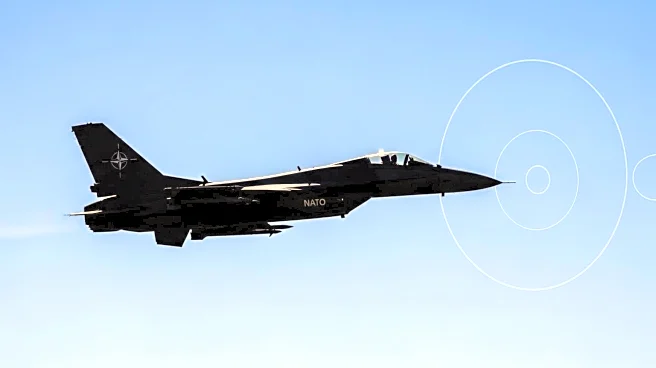What's Happening?
Recent incidents involving Russian drones and fighter jets violating NATO airspace have raised concerns about escalating tensions between Russia and NATO member countries. Notably, Russian drones entered Poland's borders, and MiG-31 fighters intruded into Estonia's airspace, prompting Italian F-35s to intercept them. These provocations are part of a pattern of Russian military activities testing NATO's resolve. Historical context from the Cold War era shows similar incidents where US and Soviet aircraft engaged in confrontations, often resulting in shootdowns without leading to broader conflicts. NATO's current strategy involves reinforcing red lines and maintaining credibility by potentially shooting down intruding aircraft, a measure seen as necessary to deter further provocations.
Why It's Important?
The significance of these events lies in the potential impact on international relations and security dynamics within Europe. NATO's response to Russian provocations is crucial in maintaining regional stability and preventing escalation into larger conflicts. The ability to deter Russian aggression through strategic military actions reinforces NATO's credibility and commitment to protecting member states. This situation also highlights the importance of diplomatic channels and military protocols developed during the Cold War to manage such incidents. The broader implications include the need for European countries to engage in direct communication with Russia to mitigate risks and maintain peace.
What's Next?
As the US shifts its strategic focus away from Europe, European NATO members may need to take a more active role in managing relations with Russia. This includes enhancing military-to-military contacts and engaging in behind-the-scenes diplomacy to prevent further provocations. The potential for increased military readiness and strategic planning among NATO members is likely, as they prepare to respond to any future incursions. Additionally, ongoing monitoring of Russian activities and maintaining open communication channels will be essential in preventing misunderstandings and ensuring regional security.
Beyond the Headlines
The deeper implications of these events involve the psychological operations employed by both sides to test each other's resolve. The lessons from the Cold War suggest that while military actions are necessary to enforce boundaries, diplomacy remains a critical tool in preventing escalation. The balance between force and negotiation will continue to shape NATO's approach to handling Russian provocations. Furthermore, the situation underscores the importance of unity among NATO members in facing external threats and maintaining collective security.











